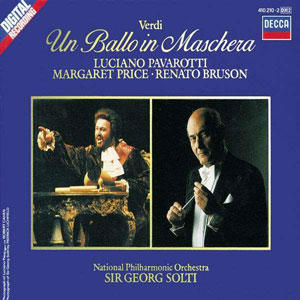Verdi Un ballo in maschera
View record and artist detailsRecord and Artist Details
Composer or Director: Giuseppe Verdi
Genre:
Opera
Label: Decca
Magazine Review Date: 9/1985
Media Format: Cassette
Media Runtime: 0
Mastering:
DDD
Catalogue Number: 410 210-4DH3

Tracks:
| Composition | Artist Credit |
|---|---|
| (Un) ballo in maschera, '(A) masked ball' |
Giuseppe Verdi, Composer
Alexander Oliver, Judge, Tenor Christa Ludwig, Ulrica, Contralto (Female alto) Georg Solti, Conductor Giuseppe Verdi, Composer Kathleen Battle, Oscar, Soprano London Opera Chorus Luciano Pavarotti, Riccardo, Tenor Malcolm King, Tom, Bass Margaret Price, Amelia, Soprano National Philharmonic Orchestra Peter Hall, Servant, Tenor Peter Weber, Silvano, Baritone Renato Bruson, Renato, Baritone Robert Lloyd, Sam, Bass Royal College of Music Junior Department Chorus |
Composer or Director: Giuseppe Verdi
Genre:
Opera
Label: Decca
Magazine Review Date: 9/1985
Media Format: CD or Download
Media Runtime: 0
Mastering:
DDD
Catalogue Number: 410 210-2DH2

Tracks:
| Composition | Artist Credit |
|---|---|
| (Un) ballo in maschera, '(A) masked ball' |
Giuseppe Verdi, Composer
Alexander Oliver, Judge, Tenor Christa Ludwig, Ulrica, Contralto (Female alto) Georg Solti, Conductor Giuseppe Verdi, Composer Kathleen Battle, Oscar, Soprano London Opera Chorus Luciano Pavarotti, Riccardo, Tenor Malcolm King, Tom, Bass Margaret Price, Amelia, Soprano National Philharmonic Orchestra Peter Hall, Servant, Tenor Peter Weber, Silvano, Baritone Renato Bruson, Renato, Baritone Robert Lloyd, Sam, Bass Royal College of Music Junior Department Chorus |
Author: Alan Blyth
He is partnered by the musically faultless Margaret Price who, as ever, has read, marked and learned the score in hand so she can deliver it as the composer wants. It is rewarding to hear intervals cleanly taken, nothing blurred or shirked. She also injects much feeling into the role, without always quite suggesting the spontaneity and vulnerability the more vocally cautious and doubtful Ricciarelli manages for Abbado (DG). Price is at her very best, and most appealing, when in fact she is appealing to her husband for clemency: the prayer is eloquently and flexibly done.
Bruson was also Abbado's Renato. His performance here is, if possible, even more expressive, the moulding of a Verdian phrase instinctive. Both the character's sympathetic and anguished side are amply encompassed. However, the voice has grown a little woolly and the highest notes in the part do not have the ping and bite that Cappuccilli provides in his not inconsiderable performance for Muti (HMV). In what is perhaps the opera's most originally conceived scene, the oath-swearing and invitation to the ball, where the darkest and lightest elements in the score are subtly combined, Bruson is joined by the splendid conspirators of Malcolm King and Robert Lloyd, the charming, secure and vocally fleet Oscar of Kathleen Battle, who dispatches her two little arias with more success than any other Oscar in a complete set.
Christa Ludwig may seem a strange choice for Ulrica, but in fact she manages the role admirably, rather more attentive to Verdi's wishes as regards dynamics and phrasing than many of her rivals. She also carries the weight and authority for the part, and shows due horror when reading her ruler's hand.
So, why am I not going to welcome this new version wholeheartedly? Well, I regret to say that I find Solti's approach hard-driven and unsympathetic, a feeling enhanced by the too emphatic playing of the National Philharmonic. For instance, the ball music sounds anything but an expression of joy as done here. When he does relax, Solti often goes to the other extreme and allows the music almost to come to a standstill, as when he falls into the old trap of applying the piu lento in the love duet many bars before Verdi asks for it, so that when that mark is reached it is impossible for the music to get any slower. Of course, it is often an exciting interpretation but in a febrile way that Abbado's much subtler, better coordinated reading quite avoids, and as I found when reviewing the DG there is a real sense there of a theatrical occasion. Decca's acoustic, highly reverberant with an over-loud orchestra, specially on CD, brings back to mind old fears about digital, the sense of a no-man's-land sound. In brief, I found listening to the set on Cd somewhat exhausting in aural terms. For once, I think I had a preference for the slightly less blatant LPs.
Although the Abbado version is not so uniformly well cast as this new one, I still find it the more satisfying, the more Verdian performance, and anxiously await its appearance on CD. Muti has much to commend him but is not quite in the Abbado class. For sheer dramatic conviction the old Votto (mono HMV) has much going for it, not least the most convincing Amelia on record (Callas), but the sound is dated. A vocal feast the Decca undoubtedly offers and I shall return to it for Price, Pavarotti and the others, but perhaps it was recorded over too wide a space of time for it to approach the essential unity of approach on all sides.'
Discover the world's largest classical music catalogue with Presto Music.

Gramophone Digital Club
- Digital Edition
- Digital Archive
- Reviews Database
- Full website access
From £8.75 / month
Subscribe
Gramophone Full Club
- Print Edition
- Digital Edition
- Digital Archive
- Reviews Database
- Full website access
From £11.00 / month
Subscribe
If you are a library, university or other organisation that would be interested in an institutional subscription to Gramophone please click here for further information.





